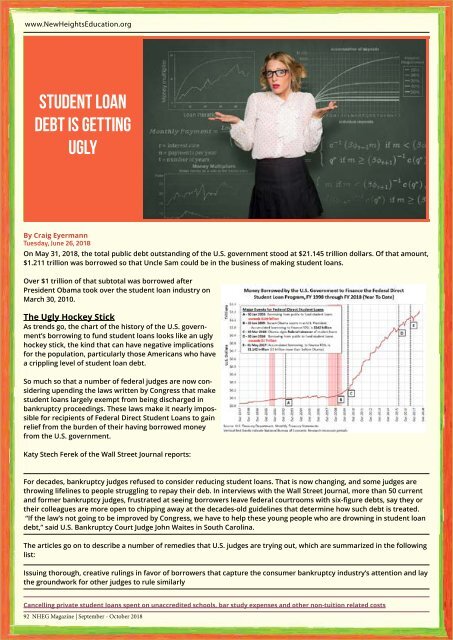NHEG-Magazine-September-October
Create successful ePaper yourself
Turn your PDF publications into a flip-book with our unique Google optimized e-Paper software.
www.NewHeightsEducation.org<br />
www.NewHeightsEducation.org<br />
Clarifying that student loan borrowers should be allowed by trustees to make full loan payments during the chapter 13 repayment<br />
period, which typically lasts five years<br />
Student Loan<br />
Debt is Getting<br />
Ugly<br />
Agreeing to discharge the tax bill that a borrower in a federal student loan repayment program could face in 25 years for<br />
forgiven debt<br />
Encouraging lawyers to join nonprofit groups that represent student loan borrowers for free<br />
While many of these judicial debt-relief strategies provide some benefit to those who have gone through the courts, by and<br />
large, the effects represent only a trivial nibbling around the edges of a much, much bigger problem.<br />
The Government Is the Problem<br />
The bigger problem is that the U.S. government is in the business of making student loans in the first place, where it has<br />
cumulatively borrowed more than a trillion dollars to be in that business. Because of its own massive borrowing, Uncle<br />
Sam cannot afford to let many student loan borrowers off the federal hook.<br />
That’s why when the government has provided relief to its stressed student loan borrowers, it has done so in the form<br />
of income-based repayment plans, which trade regular student loan payments for what amounts to a special additional<br />
income tax levied on the borrower.<br />
By Craig Eyermann<br />
Tuesday, June 26, 2018<br />
On May 31, 2018, the total public debt outstanding of the U.S. government stood at $21.145 trillion dollars. Of that amount,<br />
$1.211 trillion was borrowed so that Uncle Sam could be in the business of making student loans.<br />
Over $1 trillion of that subtotal was borrowed after<br />
President Obama took over the student loan industry on<br />
March 30, 2010.<br />
The Ugly Hockey Stick<br />
As trends go, the chart of the history of the U.S. government’s<br />
borrowing to fund student loans looks like an ugly<br />
hockey stick, the kind that can have negative implications<br />
for the population, particularly those Americans who have<br />
a crippling level of student loan debt.<br />
So much so that a number of federal judges are now considering<br />
upending the laws written by Congress that make<br />
student loans largely exempt from being discharged in<br />
bankruptcy proceedings. These laws make it nearly impossible<br />
for recipients of Federal Direct Student Loans to gain<br />
relief from the burden of their having borrowed money<br />
from the U.S. government.<br />
There is a solution. The U.S. government can return the student loan business to the private sector, allowing lenders and<br />
academic institutions to assume the primary risks for when their students might default on their loans.<br />
At the same time, Congress should rewrite the nation’s laws to once again make student loans fully dischargeable through<br />
bankruptcy proceedings. Just like almost every other kind of debt.<br />
Until it does, that ugly hockey stick is only going to get uglier.unschooler, but after writing back and forth to the girl, he<br />
realized that he liked both the girl and the writing! He became increasingly passionate about writing, ultimately majoring<br />
in journalism in college and becoming a successful journalist.<br />
When learning is connected to living, it is meaningful. It is not something that occurs at certain times, in certain places,<br />
with certain people. It occurs all the time, everywhere, and with everyone around us. Unschooling allows natural learning<br />
to occur by providing the time, space, support, and opportunity for interests to emerge and talents to sprout.<br />
With unschooling, reading, writing, and arithmetic become purposeful activities connected to personal interests and<br />
motivations.<br />
Writing letters is enjoyable and important when it is necessary for your own purposes. Writing letters when someone else<br />
tells you to—when it is forced—may not be so fun or helpful. As Plato warns: "Knowledge which is acquired under compulsion<br />
obtains no hold on the mind."<br />
Source: The Foundation for Economic Education (FEE)<br />
https://fee.org/<br />
Katy Stech Ferek of the Wall Street Journal reports:<br />
For decades, bankruptcy judges refused to consider reducing student loans. That is now changing, and some judges are<br />
throwing lifelines to people struggling to repay their deb. In interviews with the Wall Street Journal, more than 50 current<br />
and former bankruptcy judges, frustrated at seeing borrowers leave federal courtrooms with six-figure debts, say they or<br />
their colleagues are more open to chipping away at the decades-old guidelines that determine how such debt is treated.<br />
“If the law’s not going to be improved by Congress, we have to help these young people who are drowning in student loan<br />
debt,” said U.S. Bankruptcy Court Judge John Waites in South Carolina.<br />
The articles go on to describe a number of remedies that U.S. judges are trying out, which are summarized in the following<br />
list:<br />
Issuing thorough, creative rulings in favor of borrowers that capture the consumer bankruptcy industry’s attention and lay<br />
the groundwork for other judges to rule similarly<br />
Cancelling private student loans spent on unaccredited schools, bar study expenses and other non-tuition related costs<br />
92 <strong>NHEG</strong> <strong>Magazine</strong> | <strong>September</strong> - <strong>October</strong> 2018<br />
<strong>September</strong> - <strong>October</strong> 2018 | <strong>NHEG</strong> <strong>Magazine</strong> 93


















